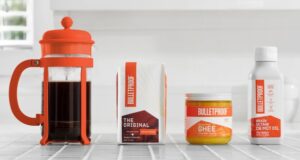We are creatures of habit, right? For many of us, that is most evident in our morning coffee routine.
When someone mentioned putting butter in my coffee I thought they were nuts. No way was anyone messing with my coffee.
And then I got sick — diagnosed with CIRS (Chronic Inflammatory Response Syndrome) which was triggered by exposure to mold. I was told to watch Dave Asprey’s documentary, Moldy Turns out Dave and I both are in the 25% of the population that cannot process toxins from mold, and subsequently, we both got very sick. When Dave discovered that many coffee beans are contaminated with mycotoxins from mold, he refused to give up drinking coffee as there are many health benefits to drinking coffee — it’s anti-inflammatory and loaded with polyphenols — so he set out on a quest to find clean coffee beans. Not long after, his Bulletproof brand was born.
One study found that between three to four cups a day are associated with the largest reduction in risk for disease.
Bulletproof Coffee, aka butter coffee or keto coffee, is made by blending together freshly brewed coffee, MCT oil, and grass-fed butter or Ghee, and has many additional health benefits. Get the recipe here. (I also add collagen protein powder.)
I’m hooked! Now, anytime I drink coffee that is not “clean,” I notice a difference. I get that ‘caffeine crash’ and I feel the acidity in my mouth.

Bulletproof recommends you brew with a metal filter to preserve your coffee’s natural oils and polyphenols. And to avoid as much plastic as possible, I use a brewing system by OXO that has a glass water tank, silicone parts, and a stainless steel carafe.
~~~~
Other clean coffees I like:
Danger Coffee — Everyone is depleted in minerals and electrolytes, which is why you feel tired and don’t show up how you’d like to. Danger Coffee is remineralized, which means it puts minerals back into your cells where they belong and it gives you access to the minerals you already have.
Purity Coffee — They believe that innovation around coffee and health could have a significant positive impact on millions of people – from the growers at the source all the way through the production chain to the end consumer.
Kicking Horse Coffee — female-owned for over 25 years with 100% certified Organic and Fairtrade Arabica beans roasted in the Rocky Mountains.
BLK & Bold Coffee – black-owned and donates 5% of its profits to nonprofit organizations to support at-risk youth.
Grounds & Hounds Coffee — organic and eco-friendly specialty coffees with 20% of all profits deployed to their dog rescue organizations.
Look for local coffee, as well. Some small farms can’t afford certifications in spite of employing sustainable growing practices. Contact your local roaster, who should have information on the beans they buy.
What do all the coffee certifications mean?
USDA Certified Organic: Producers cannot use synthetic substances such as most pesticides, herbicides, and fertilizers. If coffee is labeled “organic,” at least 95 percent of the beans must have been grown under organic conditions.
Rainforest Alliance Certification: The Rainforest Alliance certifies coffee, as well as other products and services when it is produced under certain standards. In general, Rainforest Alliance standards are intended to protect the environment and the rights of workers. For example, it requires a certain amount of native vegetation to be grown and maintained on each coffee farm.
Fair Trade Certified: Farmers who produced the coffee are guaranteed a consistent wage. Almost 90% of fair trade coffee is also organically produced.
Direct Trade: Coffee roasters buy straight from the growers, cutting out both the traditional middleman buyers and sellers.
Bird-Friendly: Bird Friendly standards are the strictest of the third-party environmental standards. Certified coffees carry this seal.
Carbon-Neutral: Carbon neutrality is concerned solely with environmental impacts, not working conditions for coffee producers. But many of the companies that care enough to go through the effort to try to make their operations carbon-neutral are also concerned about labor conditions for farmers and their workers. The problem is, given all the forms of energy use and all the complexities involved in international trade such as the coffee business, proving precise carbon neutrality is a lot like trying to measure air.
Shade Coffee: Many roasters and sellers support producers who raise coffee in the traditional way, which maintains at least part of the natural canopy of trees that provides a habitat for birds and other wildlife. But because there is no third-party or government certification, there are no strict standards to be met by producers who describe their coffee as shade-grown.
